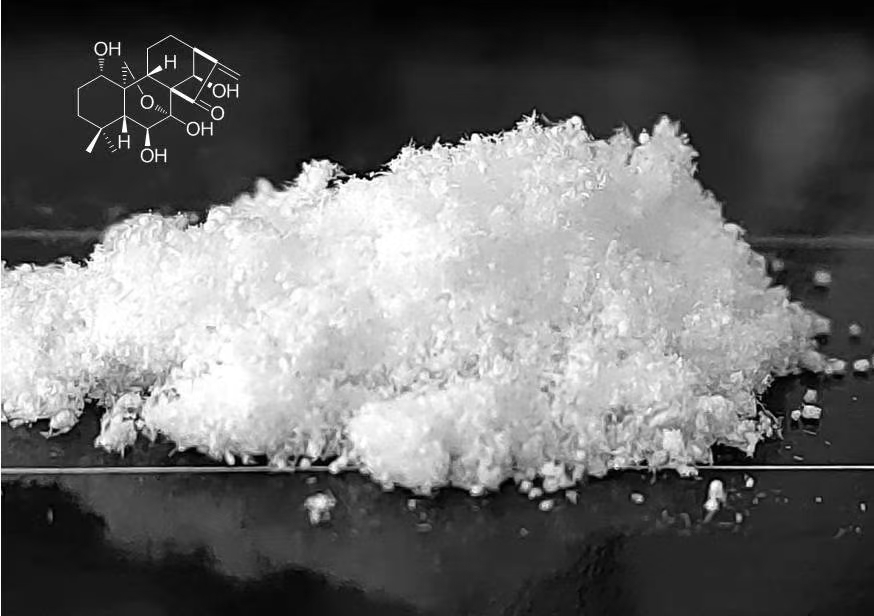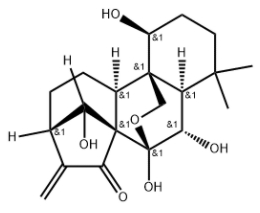This product refers to the dry above-ground portion of the Labiaceae plant Rabdosia rubescens (Hemsl.) Hara. The leaves are cut and dried during the summer and autumn when they are in full bloom.
【Properties】The stem base of this product is approximately circular, and the upper part is a square column, measuring 30 to 70 cm in length. The surface is reddish-purple and covered with soft hairs; it is hard and brittle, and the section is light yellow. The leaves are opposite and sessile; the leaves are crumpled or broken, and the intact ones are oval or oval-rhomboid after being flattened, 2 to 6 cm in length and 1.5 to 3 cm in width. The apex is acute or acuminate, the base is broadly cuneate, abruptly reduced into a pseudo-wing, and the margin is coarsely serrated; the upper surface is brown-green, the lower surface is light green, and the veins are sparsely hairy. Sometimes, it flowers, with cymose panicles at the terminal, the flowers are small, the calyx is barrel-shaped and bell-shaped, with 5-lobed teeth, and the corolla is bilabiate. The air has a slightly fragrant smell, and the taste is bitter and sweet.
【Sex and taste】Bitter, sweet, and slightly cold. Under the lung, stomach, and liver meridians.
【Function and indications】Clearing heat and detoxifying, promoting blood circulation and alleviating pain. For sore throat, masses, snake and insect bites.
Chemical Composition
The chemical composition of S. rubiformis is intricate, predominantly encompassing terpene compounds such as monoterpene, diterpene, and triterpene, and also encompassing volatile oil, steroids, flavonoids, alkaloids, amino acids, organic acids, monosaccharides, and other constituents.
【1】Diterpenoids
Diterpenoids constitute the principal components of Rabdosia rubescens. Currently, over 200 diterpenoids are known in Rabdosia rubescens, among which the principal skeleton configurations comprise ent-kaurane type and seco-ent-kaurane type.
【2】Alkaloids
Among the alkaloids contained in Rabdosia rubescens, aurantiamide acetate, N -(2-aminoacyl-phenyl) -2-hydroxybenzoyl-5-O-β-D-alloside, 2-amino-3-phenylpropyl 2-benzoyl-3-cholol ester, etc.
【3】Monoterpenes and Volatile Oils
There are a considerable amount of volatile oils, mostly monoterpenes and long-chain hydrocarbons.
【4】Triterpenoids and Steroids
There are triterpenoids in Rabdosia rabdosa, such as ursolic acid of ursulane type and oleanane type. The findings indicated that the triterpenoids betulin and betulinic acid could be isolated from S. rubescens, and coca diol could be obtained from S. rubescens. Steroids mainly encompass β-sitosterol, β-carotenoside, stigasterol, and so forth.
【5】Amino Acids and Flavonoids
Rabdosia rubescens is a homologous plant of medicine and food. It contains abundant amino acids, among which 7 are essential to the human body. The main amino acids in S. rubescens are glutamic acid, methionine, leucine, isoleucine, threonine, valine, tryptophan, phenylalanine, histidine, and proline, among which the content of glutamic acid is the highest. The flavonoids contained in Rabdosia rubescens include quercetin, 5, 4 '-dihydroxy-6,7,8,3' -tetramethoxy-flavonoids, silymarin, humin, 5, 3 ', 4 '-trihydroxy-6, 7-dimethoxy-flavonoids, emodin -8-o-β-d-glucoside, emodin methyl ether, alfalfa, and so on.
【6】Organic Acids and Sugars
Dong ling grass contains organic acids mainly including 1, 5-2 - (3, 4 - dihydroxy phenyl) - vinyl ether, 3 - (3, 4 - dihydroxy phenyl) - 2 - isopropyl oxygen radicals - propionic acid, phthalic acid double - (2 - ethyl hexyl ester), caffeic acid, salicylic acid, rosemary acid, rosemary acid methyl ester, ferulic acid, and n-butyl acetate, 3 = armour, 4-dihydroxyphenyllactic acid, vanillic acid, protocatechualdehyde, (10 Z, 14 Z)-9, 16-dicarbonyl -10, 12, 14-triene-octadeconic acid, etc. There are α-D-fructofuran, glucose, mannose, and other monosaccharides and a large quantity of polysaccharides in Rabdosia rabdosa.
In a word,Regarding medicinal utilization, the pharmacological effects of Rabdosia rabdosa predominantly center on anti-tumor, antibacterial, and anti-inflammatory investigations. The diterpenoids within Rabdodendron rabdodendron exhibit anticancer activity, and the research on these diterpenoids and their structural modifications for anticancer purposes constitutes the current research focus. The antibacterial and anti-inflammatory studies of Rabdosia rabdosa conducted both domestically and internationally are extensive, with significant outcomes, and it has been discovered that it demonstrates a favorable effect on multiple inflammatory disorders. Simultaneously, the flavonoids of Rabdosia rabdosa can enhance the activity of antioxidant enzymes and enhance the body's antioxidant capacity, and its polysaccharide components can boost both humoral and cellular immunity. Nevertheless, few studies on these pharmacological effects have been reported, which, to a certain extent, restricts the direction of further research on Rabdosia rabdosa. The pharmacological effects of other active components of Rabdosia rabdosa should be studied comprehensively and systematically. Concerning consumption, mainly taking Rabdosia rabdosa as the raw material to develop and produce health tea, composite beverages, such as rabdosa tea with burdock seeds and rock sugar, which has the effect of clearing heat and detoxifying, promoting blood circulation and alleviating pain, and can be utilized to relieve swelling and pain in the throat. When combined with cassia herb and Prunella sinensis, the healthcare products have remarkable effects on lowering blood pressure and regulating blood lipids, but the varieties are scarce and relatively insufficient, and the development and research on its consumption still require improvement.
Product Recommendation
| Product name | Oridonin | Appearance | Structural formula |
| Cas No. | 28957-04-2 |  |  |
| Molecular formula | C20H28O6 |
| Molecular weight | 364.44 |